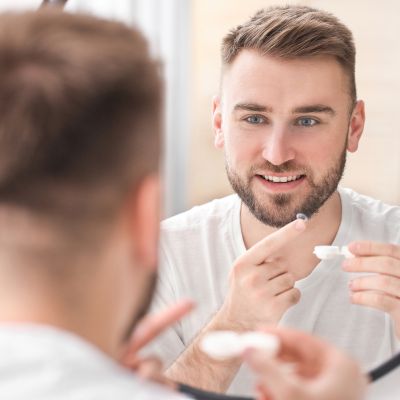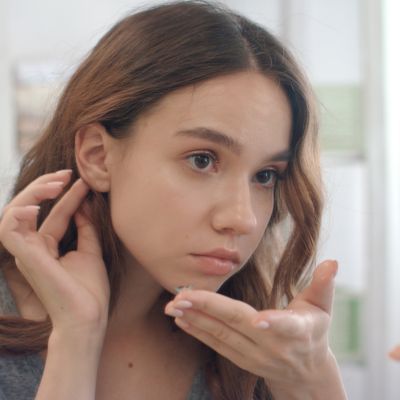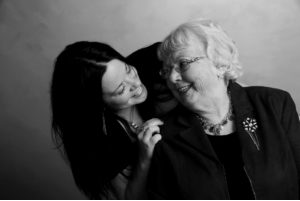“Ulcers” and “eyes”—those are two words you never want to hear used in the same sentence. Yet people who wear their contact lenses for too long risk that and more.
Some individuals are more prone to risks associated with wearing contacts. Misuse and not caring for your contacts properly can cause issues such as ulcers and infections. Who’s especially prone to these risks? Teens and young adults whose late nights and chaotic schedules give them more than the usual temptation to nod off without taking their contacts out first can be more susceptible to issues related to sleeping in contacts.
In this video from Insider Science, Dr. Irina Belinsky explains what happens when you sleep in your contact lenses.
Don’t Cut Corners When It Comes to Contact Lens Safety
Some types of lenses are meant to be left in longer, of course, but many people try to cut expenses by stretching the wear of each pair of contacts. Others just get too busy or too tired. Whatever the reason, leaving contacts in longer than they should be isn’t the best idea for the health of your vision.
According to the Centers for Disease Control and Prevention (CDC), an estimated 45 million people in the United States wear contact lenses. Of those contact lens wearers, about 25% are under the age of 24—and a full 40-90% don’t follow instructions when it comes to caring for them.
“Approximately 99% of respondents reported at least one contact lens hygiene behavior previously associated with an increased risk of eye infection or inflammation,” says the CDC.
And here’s one more horrifying statistic: Eye infections account for a million doctor visits each year.
Dr. Travis Thompson of Hardin Valley Eyecare & Optical in Knoxville, TN explains that the risks of sleeping in your contact lenses, leaving them in too long, and not caring for them properly can include:
- Ongoing dryness and redness problems.
- Corneal ulcers from bacterial and viral infections can lead to surgery and/or blindness.
- Giant papillary conjunctivitis, which is an allergy to contact lenses.
- Complications from blood vessel growth into your cornea because of lack of oxygen can eventually lead to blindness.
Dryness & Redness
Contact lenses can reduce oxygen flow to the eyes, resulting in dryness, redness, and irritation. This can be made worse by improper lens care or by wearing your contacts for too long. This can cause the lenses to accumulate bacteria and debris, resulting in dry and red eyes, meaning irritation and discomfort for you.
Corneal Ulcers
Contact lenses can cause corneal ulcers when they haven’t been properly cleaned or from another form of contamination. It starts with bacteria, fungi, or other contaminants accumulating on the lens. They then penetrate the cornea, causing an infection.
Giant Papillary Conjunctivitis
Giant papillary conjunctivitis (GPC) can be caused by constant friction between the lenses and the external linings of the eyelid and eye. It results in papillae—large bumps on the inner part of the eyelid that irritate the eye. GPC can also be caused by an allergic reaction to proteins or deposits in contact lenses.
Learn how you can be allergic to contacts and contact lens solutions.
Blindness
Blindness due to contact lenses is rare, but it does happen occasionally. It can be caused by infections from poor hygiene such as not washing your hands before handling the lenses. This can lead to a severe infection and blindness if not treated. Similarly, wearing lenses for too long can prevent the cornea from getting enough oxygen. This can cause ulcers that eventually result in vision loss without treatment.
Dr. Thompson says, “These are the most common problems I see with teens and contact lens compliance if they are wearing a monthly contact lens. This is why I always recommend daily lenses.”
Hardin Valley Eyecare & Optical carries a variety of daily contact lens options, no matter your vision needs or budget.
Learn more about daily contact lenses vs. monthly lenses options.
Why Daily Lenses Are Safer & More Cost-Effective
“I recommend everyone wear daily lenses—especially children and teens,” says Dr. Thompson of Hardin Valley Eyecare & Optical.
“Daily lenses are disposable—you put them in and take them out in a single day, then toss them,” says Dr. Thompson, adding, “They take a lot of the responsibility out of contact lens wear because you don’t have to clean the lenses or change them at a certain time—and you only touch the lens twice.”
Daily lenses are the healthiest choice because they pose the lowest risk of getting eye infections, are easiest to comply with safe-use practices, and they also keep the eye comfortable the longest.
Dr. Thompson notes, “Daily lenses may be more expensive upfront, but when you factor in how much you are paying for contact lens solution, spare lens cases, and office visits due to painful eyes from infections, it evens the price out.”
Hardin Valley Eyecare & Optical has provided the highest quality products and trusted optometry services for vision correction—including the right prescription contact lenses—to our patients in Knoxville and the surrounding areas since 2009. Whether you wear glasses or want to upgrade to daily contact lenses, we can help you find the right option for your lifestyle.
Are you ready to make the jump to daily disposable lenses? Contact us today to schedule your appointment!
Wearing contact lenses for too long can result in painful ulcers. This is especially common in teens and young adults due to their busy lifestyles. Poor contact lens hygiene can lead to other complications such as dryness and redness, giant papillary conjunctivitis, and even vision loss. You can prevent this for your teens and young adults by switching them to daily contact lenses.
Hardin Valley Eyecare & Optical has been serving Knoxville since 2009. Located at 10904 Spring Bluff Way, you can schedule an appointment online or give us a call at (865) 888-0892.
Editor’s Note: This post was originally published in September 2019 and has been updated for clarity and comprehensiveness.





